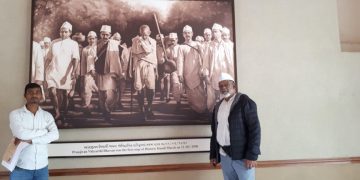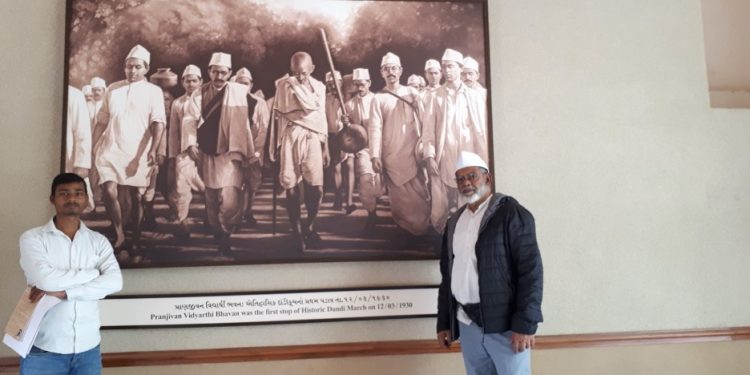On October 2, 1869 a great teacher was born in Porbandar, Gujarat, India, and the United Nations has asked all mankind to remember his contributions to human civilization by declaring that date as the International Day of Non-Violence. Too many of his birthdays have gone by without any sustained efforts to pass on his message to those who may not know of him or his achievements. Excessive reliance is placed on national organisations planning an event in which only a few participate. However without great fanfare every single person irrespective of race, religion, nationality or social status, can show appreciation for this great soul by trying to step into his shoes. His life and message can still contribute to the resolution of many of the problems caused and faced by humans today and it is an opportune time to show gratitude and respect for the spiritual politician who proved that TRUTH and NON-VIOLENCE can change the world.
The following are only a few of the activities that every person, especially those who do not find him a perfect human being, can attempt to sense his greatness.
Fast for the day, skip a meal or just eat less. Be a vegetarian so no animal, bird or fish has to be killed. Wear fewer clothing consistent with your climate. Do not pollute but instead clean up the environment.
See and discuss the movie GANDHI and others shows of his life. Persuade and assist all schools to get speakers to inform the children of his life and legacy.
Have courage to confront injustice but use methods that are consistent with the objectives. The “sacred warrior” first notified the oppressors of his intent and if the situation does not improve then he resorts to his weapon of peaceful non-cooperation with the source of evil. This strategy of non-violent resistance has been followed by anti -colonial and freedom movements across the globe. It can be applied to any situation of inequality and injustice even based on racial or economic suppression.
Donate blood, food, clothes, books or other material possessions to those in need, particularly to strangers.
Practice Ahimsa which does not simply mean non violence but non-harm. Words, ill-thoughts, anger, harsh judgements are all forms of harm not only to others but even to those who entertain them.
Tell the truth even it means loss of social or economic status and experience the power of moral superiority. Observe the reaction of a very rich or powerful person who is found to be untruthful.
Do not smoke or consume alcohol or anything that alters the mind.
Take the longest walk that you health will allow, either alone or with others, preferably to redress a social wrong or injustice following the precedent of Satyagraha. Passive resistance or soul force is infinitely superior to body force. Jesus, Socrates, Tolstoy, Buddha, Mandela, Martin Luther King and many successful political leaders used this method.
Be prepared to admit temporary failure if your end cannot be achieved by peaceful means at the first attempt.
Do not try to convert anyone by telling them they can only obtain salvation by following your religion because it is a blatant lie historically supported overtly and covertly by governments. It may even amount to terrorism depending on the definition of the term and the words used to generate fear. Recognise that all religions have produced charitable, loving, caring human beings yet religious differences remain one of the greatest impediments to world peace.
Be silent for as long as possible while meditating and looking inward. Control your lust, anger, greed, attachment, pride, or fear. Show respect and appreciation for your spouse or partner, family members and neighbours.
Read, share and discuss books that inspired Gandhi e.g. the Gita, his autobiography, and works of countless authors who tried to capture the secrets to his greatness.
It is remarkable how he generated power and national significance to very simple things e.g. salt he picked up after the Dandi March in 1930, spinning the charkha to make khadi or home spun cloth for economic independence.
As a lawyer he spoke of rights, but as the Mahatma he emphasized duties to each other, from respecting the poor to the welfare of all living things and eventually the entire planet.
Once this trying day is over many will appreciate his life and be willing to name a street, a building, or other structure after him. A few may even finance scholarships and courses in Peace Studies to ensure that he is guaranteed the immortality he deserves.
PEACE AND LOVE.
RAMNARINE SAHADEO
ramjihindu@rogers.com
Author of Mohandas k. Gandhi: thoughts, words, deeds.



































































